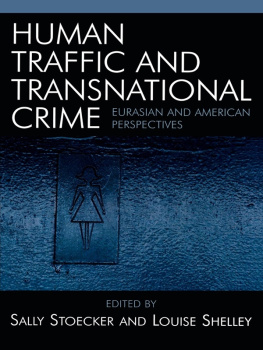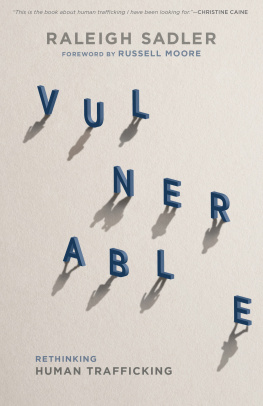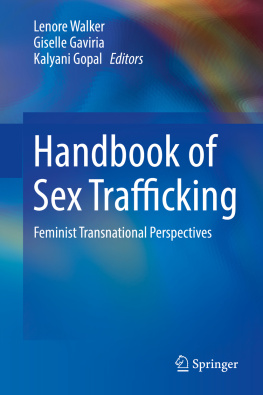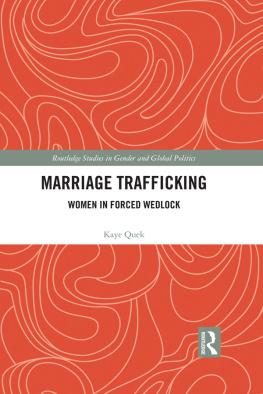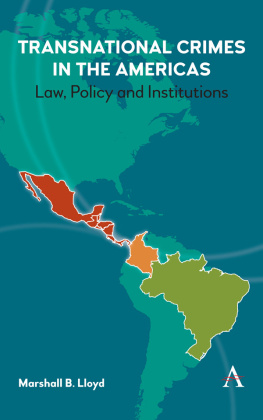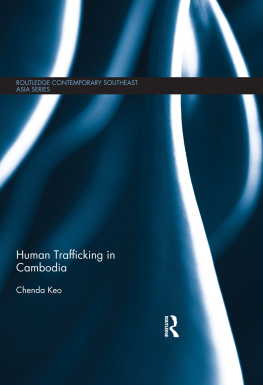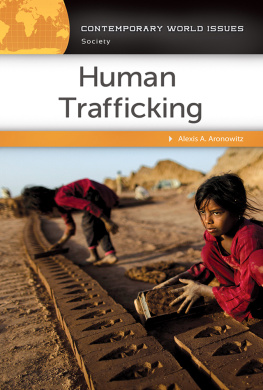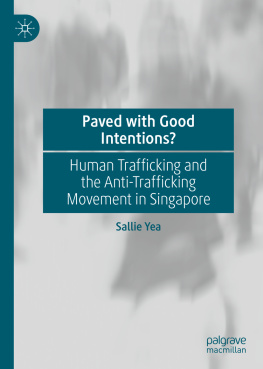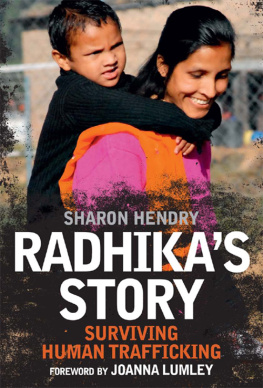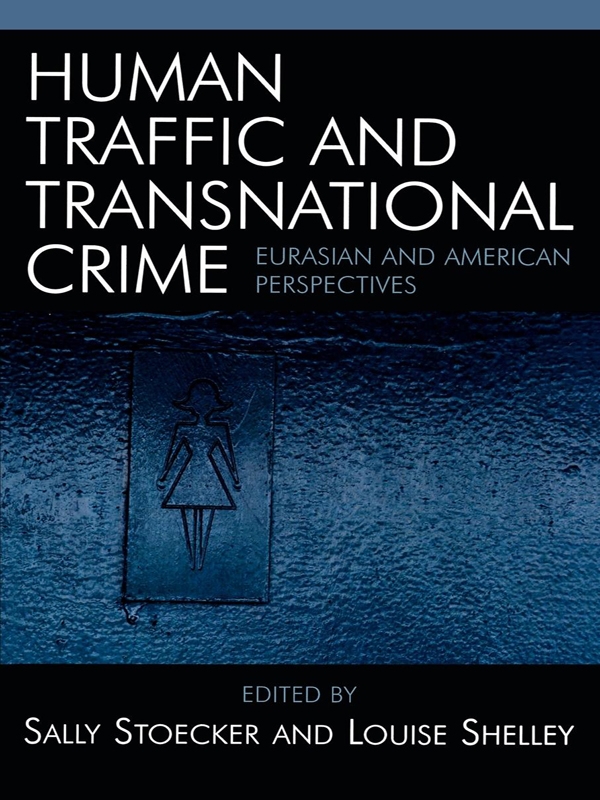W e would like to thank several individuals for their time and commitment to our research on human trafficking and for helping to develop it into a book. Susan McEachern, vice president and executive editor for area studies and geography of Rowman & Littlefield acquired our manuscript and enthusiastically supported our work. Matt Hammon, also of Rowman & Littlefield, helped to produce the book. The Department of State enabled us, through several grants, to conduct research on human trafficking in Russia and the former Soviet states of Ukraine, Moldova, and Georgia. We thank the Department in general, as well as several colleagues there: Susie Baker, Carla Menares-Bury, Sally Neumann, Amy ONeill Richards, and James Puleo. Thomas Firestone, formerly the Department of Justice resident legal adviser in Moscow, provided excellent commentary on some of the chapters and helped us in our analysis of federal human trafficking cases in the United States. We also thank our blind peer reviewers for helpful suggestions.
Several researchers in Russia worked tirelessly to provide assistance to us and to our authors: Maria Buriak in Vladivostok, Tatiana Sudakova, Vika Shakina, and Vitaly Shakin in Irkutsk and Moscow. Joyce Horn, formerly managing editor of the journal Demokratizatsiya, edited and formatted the book, which was no easy task. As always, her professionalism and skill contributed to the clarity and accessibility of this volume. Our two translators, Saltanat Sulaimanova and Irina Morozova, deserve special mention for their knowledge of the subject matter, which helped fine-tune their impeccable translations.
Finally, Keeli Nelson, Irina Morozova, and Karen Saunders of TraCCC are recognized for their untiring assistance in proofreading the text, obtaining permis sions to reprint, and gathering and translating other key documents that support the research in this book.
About the Contributors
Liudmila Erokhina holds a candidates degree in philosophy from Moscow State University and serves as senior research fellow at the Vladivostok Center for the Study of Organized Crime. She is a member of the Russian Federation Dumas working group on the creation of an antihuman trafficking law. In 2002, she was the recipient of a four-month IREX Contemporary Issues Fellowship to conduct research into the recruitment of children into sexual exploitation and the sex tourism industry at the Transnational Crime and Corruption Center (TraCCC).
Mikhail Kleimenov holds a Ph.D. in legal sciences and is a professor and distinguished scholar of the Russian Federation. He works at the Omsk Academy of the Ministry of Internal Affairs of the Russian Federation. Kleimenov graduated from the Omsk Militia High School and received his college-level degrees at the All-Union Science and Research Institute of the USSR. His main academic interests include criminology, ethnology, sociology, religion studies, and statistics. Kleimenov is the author of 130 published research papers and is the vice president of the Russian Criminological Association.
Olga Pyshchulina is a candidate of sciences in sociology and a senior consultant for the Department of Social Relations and Civil Society at the National Institute for Strategic Research of the President of Ukraine in Kyiv, Ukraine. She is recognized as a leading Ukrainian expert in illegal migration and human trafficking. She is coauthor of Ukraines first research study on human trafficking, sponsored by the International Organization for Migration in 1997. Pyshchulina is also the director of the nongovernmental organization Humanitarian Initiative.
Anna Repetskaia holds her doctorate in judicial science and is a full professor and chair of criminal law and criminology in the Department of Judicial Investigations at Baikal State University of Economics and Law. Since 1995, she has served as director of the Irkutsk Center for the Study of Organized Crime and Corruption. Her main academic interests include organized crime and corruption and issues of victimology in fighting crime.
Stanislav Shamkov is a senior legal counsel for the Transportation Department of the West Siberian branch of Russias Ministry of Internal Affairs. He works in the capacities of analyst, manager, tutor, team leader, researcher, and legal counsel. Shamkov received his university-level training in military operations, engineering, and law, and recently completed an FBI course on combating computer crime. He is the author of twelve research papers and twenty written works on incorporating research into practical work.
Louise Shelley is the founder and director of the Transnational Crime and Corruption Center (TraCCC) and a leading U.S. expert on organized crime and corruption in the former Soviet Union. Shelley is a professor in the Department of Justice, Law, and Society (School of Public Affairs) and the School of International Service at American University. Shelley received her undergraduate degree (cum laude) from Cornell University in penology and Russian literature. She holds an M.A. in criminology and a Ph.D. in sociology from the University of Pennsylvania.
Sally Stoecker is a consultant to the Transnational Crime and Corruption Center (TraCCC). From 1999 to 2002 she led two major projects on human trafficking sponsored by the U.S. Department of State. Before coming to American University in 1995, she worked for thirteen years as a research associate at the RAND Corporation in Washington, D.C. She holds a Ph.D. in international relations from the Paul H. Nitze School of Advanced International Studies, Johns Hopkins University.
Elena Tiuriukanova holds a degree from the Department of Demography of the Economics School of Moscow State University. In 1989, she received her candidates degree by defending her thesis on family economic demographics. Since 1990, she has been employed at the Russian Academy of Sciences Institute of Socio-Economic Population Issues, where she has been utilizing her extensive knowledge of economics, demography, and sociology to study complex and multidisciplinary issues of population migration. In 2003, she finished her doctoral degree work and is currently completing her doctoral dissertation.
Beatrix Siman Zakhari is academic director of both the Justice and the Law Enforcement: Liberty versus Security topics at the Washington Semester Program of American University. She earned her B.A. in sociology from Wilkes College and her doctoral degree in sociology with an emphasis on criminology from the University of Pennsylvania. The topic of her dissertation was crime during disasters. She has also studied decision-making processes among capital case jurors.
Selected Bibliography
Alexander, Priscilla. Prostitution: A Difficult Issue for Feminists. In Sex Work: Writings by Women in the Sex Industry. Edited by Frederique Delacoste and Priscilla Alexander. Pittsburgh, Pa.: Cleis Press, 1987.
Altink, Sietske. Stolen Lives: Trading Women into Sex and Slavery. London: Scarlet Press, 1995.
Andreas, Peter, and Timothy Snyder. The Wall around the West: State Borders and Immigration Controls in North America and Europe. Lanham, Md.: Rowman & Littlefield, 2000.

